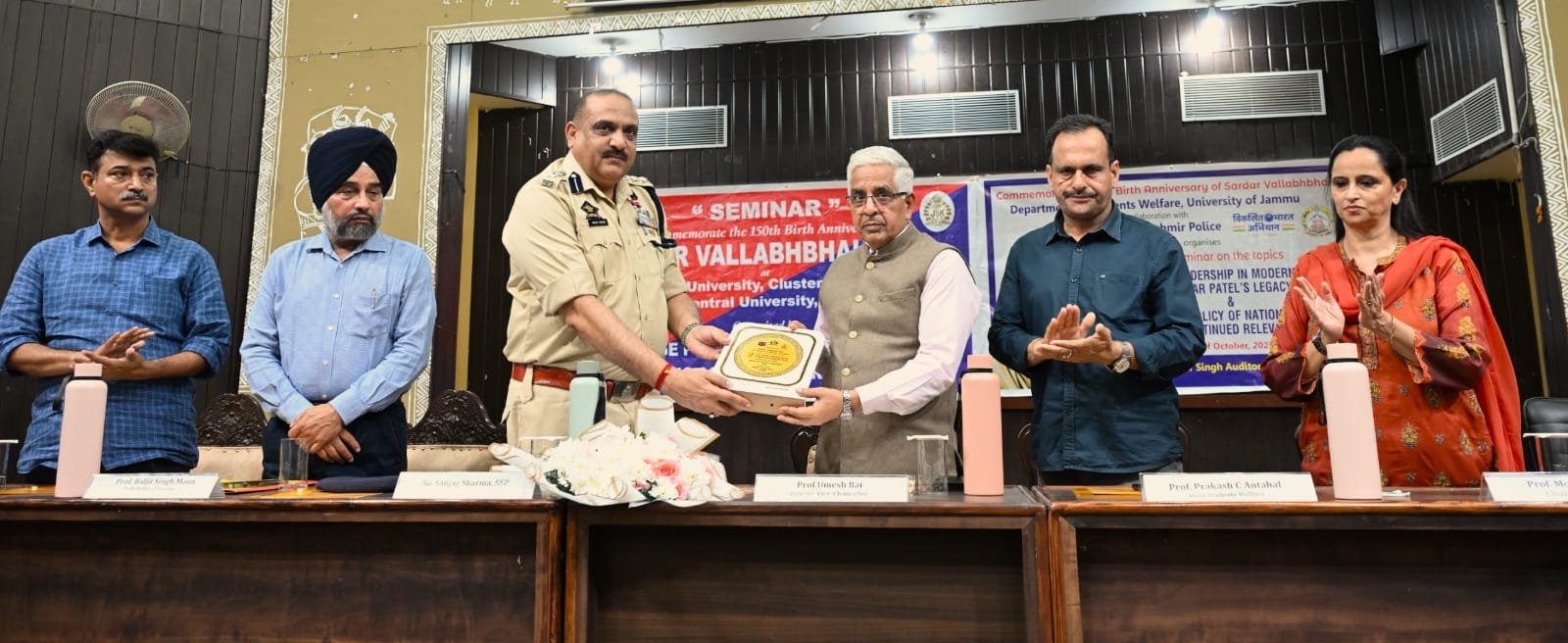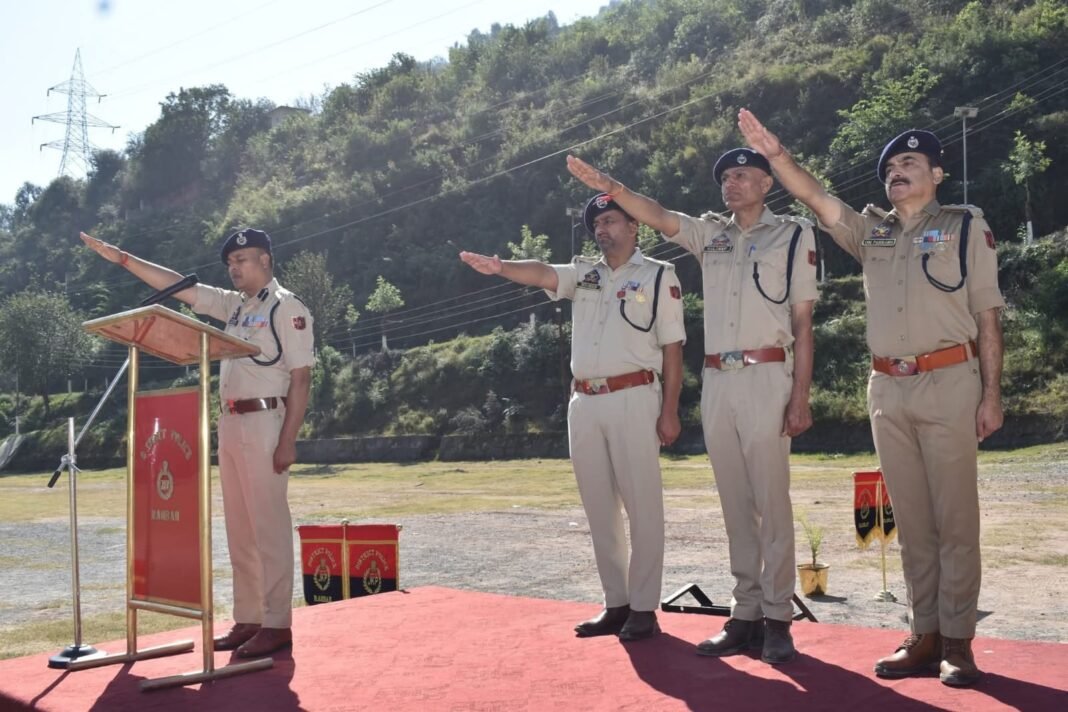Diplomat Correspondent
Jammu: DD, The Department of Students Welfare, University of Jammu, in collaboration with the Office of DIG, Jammu Samba Kathua Range, J&K Police, organized a seminar to commemorate the 150th birth anniversary of Sardar Vallabhbhai Patel on the theme “Strong Leadership in Modern India: Sardar Patel’s Legacy” and “Sardar Patel’s Policy of National Integration and its Continued Relevance” here this morning at Brig. Rajinder Singh Auditorium, University of Jammu.
Prof. Umesh Rai Hon’ble Vice Chancellor, University of Jammu, graced the occasion as the chief guest.
Speaking on the occasion, Prof. Umesh Rai, said that commemorating the 150th Birth Anniversary of Sardar Vallabhbhai Patel offers an important opportunity to reflect on the foundations of modern India.
He noted that Patel’s leadership spanned both the freedom struggle and the complex task of nation-building immediately after Independence—whether it was the Kera and Bardoli Satyagrahas, which protected the dignity of farmers, or the historic integration of more than 565 princely states that ensured India emerged as a united and sovereign nation.
Prof. Rai remarked that Sardar Patel’s life teaches us the value of clarity of purpose, steadfastness, and courage rooted in empathy. He said that Patel’s foresight in shaping India’s administrative and security framework continues to guide the nation today, especially in a changing geopolitical landscape involving our neighboring regions.
Referring to the insightful presentations made by the speakers, he emphasized the importance of engaging with authentic historical records and correspondence so that students can understand Patel’s decisions in their real historical context.
Prof. Rai also announced that the University will introduce a monthly student-led lecture and discussion series under the Department of Students Welfare, where students will speak and the leadership will listen and respond. This initiative, he said, is aimed at encouraging debate, critical thinking, and civic awareness among the youth, ensuring that the ideals of national unity, integrity, and responsible citizenship remain living values rather than distant memories.
Sanjay Sharma, SSP, Staff officer to DIG extended warm greetings on behalf of the Jammu & Kashmir Police. He noted that this seminar, organized under the Civic Action Programme in collaboration with the University of Jammu, reflects the commitment of the police to connect meaningfully with students and youth through education, dialogue, and cultural exchange.
He said that such platforms not only help us remember great national figures but also help strengthen the relationship between the police and the community by building understanding and shared purpose.
Sharma also reflected on Patel’s role as the architect of India’s administrative and police framework.
Patel believed that a strong and impartial civil service is the backbone of a stable nation.
He encouraged officers to remain honest, disciplined, and devoted to the Constitution—values that continue to guide the Indian Police and civil administration even today. He also highlighted Patel’s commitment to rural empowerment and the cooperative movement, which later led to transformative initiatives like Amul, as well as Patel’s belief in women’s leadership and participation as essential to India’s progress. Concluding his address, Sharma urged the youth to draw inspiration from Patel’s life—his integrity, courage, and unwavering belief in national unity—and reaffirmed that building a strong, united, and just India is a shared responsibility of every citizen.
The resource persons for the seminar were Prof. Virender Koundal, Head, Department of Strategic and Regional Studies and Prof. Baljit Singh Mann, Head Department of Political Science, University of Jammu.
Prof. Virender Koundal spoke about the remarkable role played by Sardar Vallabhbhai Patel in uniting India during one of the most crucial phases in the nation’s history.
He explained that while Mahatma Gandhi inspired the dream of freedom and Jawaharlal Nehru envisioned a modern India, it was Sardar Patel who turned the idea of a united nation into reality.
At the time of Independence, India was not a single, seamless map as we see today.
It consisted of more than 565 princely states, each with its own rulers and interests. Prof. Koundal highlighted how Patel, with exceptional political foresight and deep resolve, convinced and persuaded these states to integrate with the Indian Union—often through dialogue and statesmanship, and only in rare cases by firm administrative action.
This work of national unification, he said, stands as one of the most extraordinary diplomatic achievements in world history.
He further recalled how Patel, along with V. P. Menon, carefully crafted the Instrument of Accession and engaged with rulers of states such as Junagarh, Hyderabad, and Jodhpur—situations that could have otherwise led to fragmentation or long-term conflict.
Instead of coercion, Patel relied on trust, strategic negotiation, and a clear vision of a strong and united India. Prof. Koundal emphasized that the India we live in today—stretching from Kashmir to Kanyakumari and from Gujarat to the Northeast—exists in its present form because of Patel’s courage, clarity of purpose, and unwavering service to the nation.
His message concluded by reminding students that the spirit of national integration is not a historical event but a continuing responsibility that each generation must uphold.
Prof. Baljit Singh Mann reflected on Sardar Vallabhbhai Patel’s journey by placing him in the historical context of his time.
He explained that to understand any leader, one must understand the world that shaped him.
Patel lived through the peak of the anti-colonial struggle, alongside Gandhi, Jawaharlal Nehru, and other stalwarts. Trained as a lawyer, he set aside his flourishing practice to dedicate himself fully to the freedom movement.
From the Kheda Satyagraha to the Non-Cooperation and Quit India movements, Patel emerged as a decisive organiser, a committed Congress worker, and a leader who acted with clarity and conviction.
Prof. Mann noted that even before Independence, Patel demonstrated both political maturity and administrative skill—whether as President of the Ahmedabad Municipality, President of the Indian National Congress in 1931, or as a key voice in drafting Congress resolutions that later formed the basis of fundamental rights in the Constitution.
Prof. Mann further highlighted Patel’s unparalleled role in nation-building after Independence.
As Deputy Prime Minister and Home Minister, Patel faced the enormous challenge of integrating more than 500 princely states into the Indian Union.
Through dialogue, negotiation, and firm statesmanship, he succeeded in forging territorial unity—resorting to force only when all democratic avenues had failed, as in Hyderabad and Junagarh.
Beyond territorial consolidation, Prof. Mann emphasised Patel’s vision of inclusive nationalism, rooted in secularism, democratic values, and the belief that a plural society must stay united beyond caste and religion.
His approach to economic policy, favouring cooperative development and small-scale industry, revealed his sensitivity to India’s social fabric. Patel also laid the foundations of a strong and impartial civil service—the “steel frame” that would uphold constitutional values.
Prof. Mann concluded by noting that although Patel lived only a short while after Independence, his contributions continue to define the idea of India we inherit today—firm, united, and democratic.
Earlier, Prof Monika Chadha Chairperson, Campus Cultural Committee, welcomed the dignitaries and participants, highlighting the significance of revisiting Patel’s ideas in contemporary times. Prof. Sarika Manhas, Co-Chairperson, Campus Cultural Committee, presented the formal vote of thanks.
Among others present on the occasion included Prof Prakash Antahal, Dean Students Welfare, Prof. Vinay Chauhan, Director, The Business School, faculty members, members of Campus Cultural Committee, staff, scholars and students.
The proceedings of the event were conducted by Anshika Gandhi.
The seminar drew active participation from students, research scholars, and faculty members, who engaged in thoughtful discussions on the relevance of Sardar Patel’s vision in shaping a cohesive and progressive.
The events of DSW are conceived, planned and organised by the team consisting of Prof. Prakash Antahal (Dean Students Welfare), Prof. Monika Chadha (Chairperson, Campus Cultural Committee), Prof. Sarika Manhas (Co-Chairperson, Campus Cultural Committee), Dr. Pritam Singh (Associate Dean SW), Dr. Shallu Sharma & Dr. A.R. Manhas (Deputy Chief Proctors), Dr. Harleen Kaur and Dr. Ripudaman Parihar (Assistant Dean, SW), members of Campus Cultural Committee, Mansi Mantoo (Media Officer), Sumeet Sharma (Drama Instructor).
Hall management was looked after by Enamika Sharma. The sound was looked after by Kulbhushan Thakur.DD




